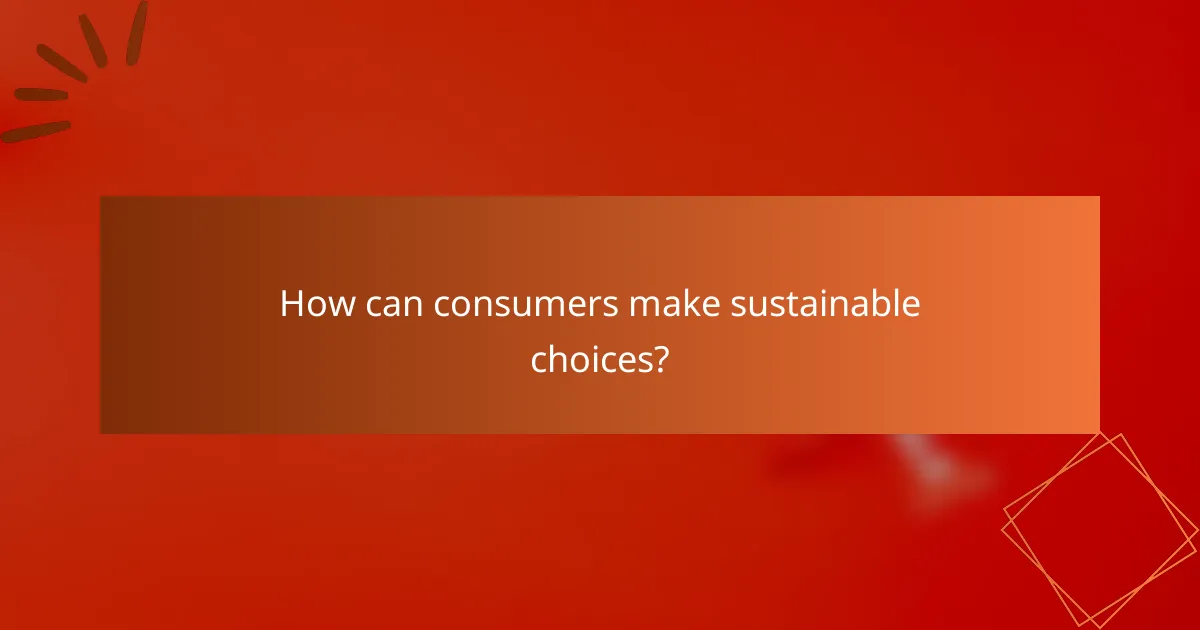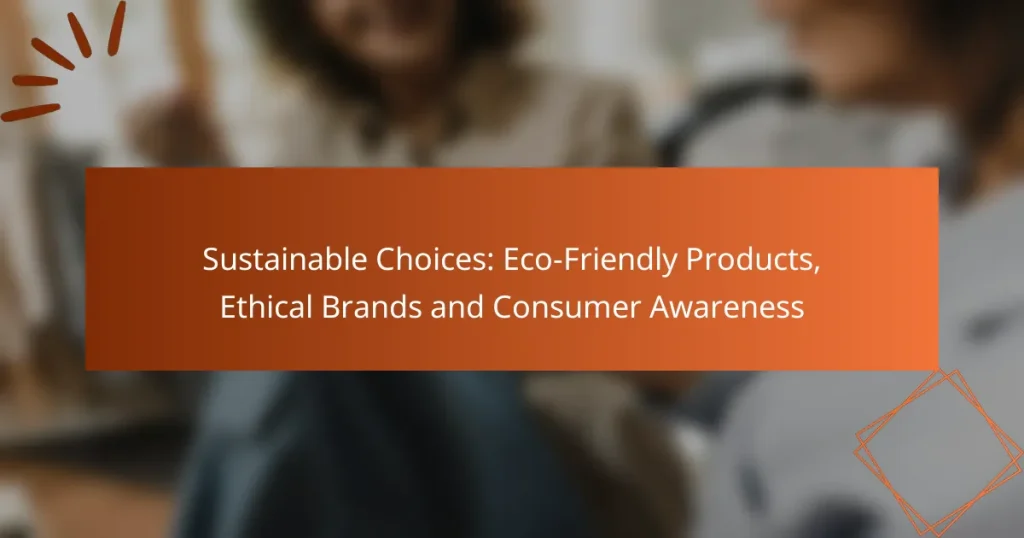In today’s world, making sustainable choices is more important than ever, as consumers increasingly seek eco-friendly products that minimize environmental impact. By opting for items like bamboo toothbrushes and biodegradable cleaning supplies, individuals can contribute to a healthier planet. Additionally, supporting ethical brands that prioritize sustainability and fair labor practices fosters a more responsible consumer culture. By being mindful of product origins and their ecological footprint, consumers can make informed decisions that benefit both themselves and the environment.

What are the best eco-friendly products available?
The best eco-friendly products focus on reducing environmental impact while offering practical benefits. Popular options include bamboo toothbrushes, reusable silicone bags, biodegradable cleaning supplies, organic cotton clothing, and solar-powered gadgets.
Bamboo toothbrushes
Bamboo toothbrushes are a sustainable alternative to plastic toothbrushes, as bamboo is biodegradable and grows quickly. When choosing a bamboo toothbrush, look for one with soft bristles made from nylon, which is more effective for dental hygiene.
To maximize their eco-friendliness, ensure you compost the bamboo handle after use and recycle the bristles if possible. Many brands offer compostable packaging, further reducing waste.
Reusable silicone bags
Reusable silicone bags are a versatile and eco-friendly substitute for single-use plastic bags. They can be used for food storage, meal prep, and even cooking, as they are heat-resistant and dishwasher-safe.
When selecting silicone bags, look for those that are BPA-free and made from high-quality food-grade silicone. They can last for years, making them a cost-effective choice for reducing plastic waste.
Biodegradable cleaning supplies
Biodegradable cleaning supplies are formulated to break down naturally without harming the environment. These products often use plant-based ingredients and come in eco-friendly packaging.
When shopping for biodegradable cleaners, check for certifications like the EPA Safer Choice label, which indicates that the product meets strict safety and environmental standards. This ensures you are making a responsible choice for your home and the planet.
Organic cotton clothing
Organic cotton clothing is produced without synthetic pesticides or fertilizers, making it a healthier option for both consumers and the environment. This type of cotton is grown using sustainable farming practices that conserve water and promote biodiversity.
When purchasing organic cotton garments, look for certifications like GOTS (Global Organic Textile Standard) to ensure the product meets rigorous environmental and social criteria. This helps support ethical production practices while reducing your carbon footprint.
Solar-powered gadgets
Solar-powered gadgets harness renewable energy from the sun, reducing reliance on fossil fuels. These devices range from solar chargers for phones to solar-powered lights and appliances.
When considering solar gadgets, assess their efficiency ratings and battery life. Investing in high-quality products can lead to long-term savings on energy costs while contributing to a more sustainable lifestyle.

Which ethical brands should consumers consider?
Consumers looking for ethical brands should consider those that prioritize sustainability, fair labor practices, and transparency. Brands like Patagonia, TOMS, Seventh Generation, Allbirds, and Warby Parker exemplify these values through their business models and product offerings.
Patagonia
Patagonia is renowned for its commitment to environmental sustainability and ethical manufacturing. The brand uses recycled materials in its products and actively supports environmental causes through its 1% for the Planet initiative.
When choosing Patagonia, consumers can feel confident that their purchases contribute to conservation efforts. The company also encourages customers to repair rather than replace their gear, promoting a circular economy.
TOMS
TOMS is famous for its One for One model, where a pair of shoes is donated for every pair sold. This approach not only addresses footwear needs but also supports various social initiatives, including education and mental health.
Consumers should consider TOMS for their commitment to social responsibility. The brand has expanded its offerings to include eyewear and coffee, maintaining its focus on giving back with every purchase.
Seventh Generation
Seventh Generation specializes in eco-friendly household products, including cleaning supplies and personal care items. The brand is dedicated to using plant-based ingredients and sustainable packaging, reducing environmental impact.
By choosing Seventh Generation, consumers can support a brand that prioritizes transparency in its ingredient sourcing and manufacturing processes. The company also advocates for stronger regulations on toxic chemicals in consumer products.
Allbirds
Allbirds focuses on sustainable footwear made from natural materials like merino wool and eucalyptus tree fibers. The brand emphasizes carbon neutrality in its production processes, making it a leader in eco-friendly fashion.
Consumers interested in stylish yet sustainable shoes will find Allbirds appealing. The company’s commitment to reducing its carbon footprint is reflected in its transparent supply chain and eco-conscious practices.
Warby Parker
Warby Parker revolutionized the eyewear industry with its direct-to-consumer model, offering affordable glasses while maintaining high ethical standards. For every pair sold, the company donates a pair to someone in need through its Buy a Pair, Give a Pair program.
Choosing Warby Parker means supporting a brand that values accessibility and social impact. The company also focuses on sustainability by using eco-friendly materials in its frames and packaging.

How can consumers make sustainable choices?
Consumers can make sustainable choices by being mindful of the products they purchase and their origins. This involves selecting items that are eco-friendly, ethically produced, and support local economies.
Research product origins
Understanding where a product comes from is crucial for making sustainable choices. Look for brands that provide transparency about their supply chains, including sourcing materials and manufacturing processes.
Check for certifications such as Fair Trade, organic, or local sourcing labels, which indicate adherence to ethical and environmental standards. This research helps ensure that your purchases support responsible practices.
Choose local products
Buying local products reduces transportation emissions and supports your community’s economy. Local goods often have a smaller carbon footprint and are fresher than imported items.
Visit farmers’ markets or local artisan shops to find seasonal produce and handmade goods. This not only fosters community relationships but also encourages sustainable farming and production methods.
Support fair trade
Fair trade products ensure that producers receive fair compensation and work in safe conditions. By choosing fair trade items, consumers can help combat exploitation and promote sustainable livelihoods.
Look for fair trade certifications on products like coffee, chocolate, and clothing. Supporting these brands contributes to ethical practices and environmental sustainability.
Reduce single-use plastics
Minimizing single-use plastics is essential for reducing waste and protecting the environment. Opt for reusable bags, bottles, and containers to decrease plastic consumption.
Consider alternatives such as glass or stainless steel for food storage and personal items. Many communities also offer recycling programs, so familiarize yourself with local regulations to ensure proper disposal of plastics.

What are the benefits of eco-friendly products?
Eco-friendly products offer numerous advantages, including reduced environmental harm, improved health outcomes, and support for sustainable practices. By choosing these products, consumers can contribute to a healthier planet while often enjoying better quality and safety.
Reduced environmental impact
Eco-friendly products are designed to minimize their negative effects on the environment. This includes using sustainable materials, reducing waste, and lowering carbon emissions during production and transportation. By opting for these products, consumers can help decrease pollution and conserve natural resources.
For example, biodegradable cleaning supplies break down naturally and do not contribute to landfill waste, while products made from recycled materials help reduce the demand for virgin resources. Choosing local products can also lower transportation emissions, further enhancing their eco-friendly benefits.
To maximize the environmental benefits, look for certifications like Energy Star or the Forest Stewardship Council (FSC) label. Avoid products with excessive packaging and prioritize those that offer refillable options. Small changes in purchasing habits can lead to significant positive impacts on the environment over time.

